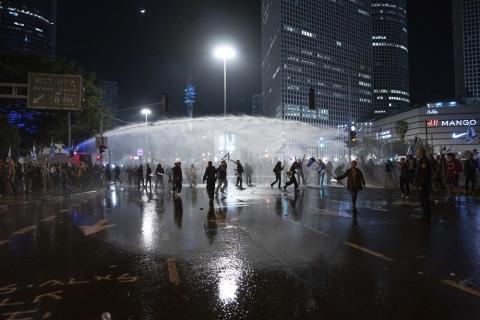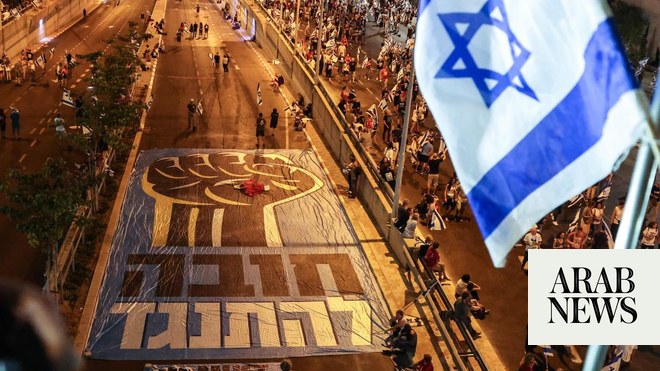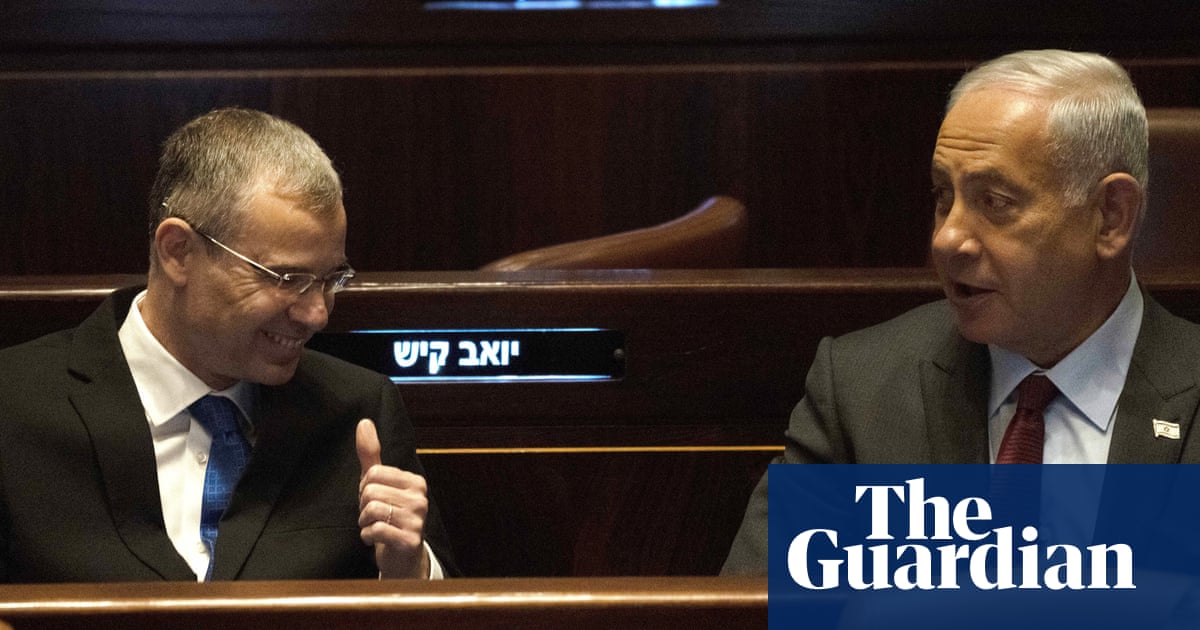
Israel’s embattled prime minister, Benjamin Netanyahu, has announced a delay to his far-right government’s proposals to overhaul the judiciary after 12 weeks of escalating political crisis.
Netanyahu said on Monday he would delay his flagship judicial changes to the next parliamentary session, saying he wanted to give time to seek a compromise over the contentious package with his political opponents.
Speaking in a televised address on Monday evening, ten hours after he was originally scheduled to give a statement, Netanyahu – looking tired and striking an unusually flat tone – said he was “not willing to tear the nation in half … When there’s a possibility of avoiding fraternal war through dialogue, I, as prime minister, will take a time out for that dialogue.”
“We have the ability to pass the legislation with a strong majority,” he added, before praising the government’s supporters. “No one will silence you,” he said.
The decision to delay only postpones the issue for several weeks, and it is not clear if the protests will end.
In exchange for agreeing to the delay, the far-right Jewish Power party said the prime minister had offered the formation of a civil “national guard”, causing concern about an armed group under the control of the far-right politician Itamar Ben-Gvir.
With corruption charges hanging over his head, Netanyahu has been forced to rely on unruly, extremist coalition partners. Although famous for his working his way out of tight spots in the past, “King Bibi” appears to be losing his touch, struggling to maintain control inside and outside the Knesset.
Opposition to the bitterly contested judicial changes peaked on Monday as hospitals, universities and the country’s largest trade union announced a general strike in protest against the plans to limit the powers of the supreme court. Tel Aviv’s airport, Israel’s main international gateway, cancelled flights, and local municipalities, nurseries, civil servants and tech workers also joined the action. After Netanyahu’s evening address, the union called off the strike.
The strikes came after a dramatic night of protests sparked by Netanyahu’s decision to sack his defence minister for opposing the judicial plans, and after significant pushback from the military, Israel’s vital hi-tech sector, and allies in the US.
While members of Netanyahu’s Likud party, as well as his ultra-Orthodox partners, appeared ready to support his decision to cave after months of public pressure, the far right proved hard to dissuade from threats to bring down the government if their demands were not met. Even as protests raged across the country overnight, a parliamentary committee continued to approve parts of the legislation, meaning the bills can go to the Knesset plenum for new readings.
The Likud member Yariv Levin, the justice minister, and the far-right MK Simcha Rothman, who chairs the Knesset’s law and justice committee – the two men spearheading the judicial proposals – had repeatedly vowed to press ahead with passing the most important laws before the Knesset breaks up for the Passover holiday on 2 April. In a tweet on Monday, Rothman urged supporters of the overhaul to take to the streets and “not to give up on the people’s choice”.
The extremist security minister, Ben-Gvir, and the finance minister, Bezalel Smotrich, also warned on social media throughout the day that the prime minister must not “surrender to anarchy”. By early evening, however, Netanyahu appeared to have reached a settlement with his coalition partners, and Jewish Power released a statement shortly before Netanyahu’s address saying the legislation would be pushed to the next session of parliament.
In exchange, Jewish Power said the prime minister had agreed to the formation of a civil “national guard” under Ben-Gvir’s control, although observers widely interpreted the move as an empty gesture on Netanyahu’s part.
Another day of protests opposing the plans picked up across Israel by lunchtime, including outside the Knesset, where Israeli media estimated 100,000 people gathered before Netanyahu’s remarks. Supporters of the overhaul mobilised by Monday evening after Likud called for a counter-demonstration.
Police numbers were reinforced to handle possible trouble after fears of violence were fuelled by social media posts calling for attacks on leftwing Israelis. In a tweet, Netanyahu appealed to supporters on both sides to avoid violence.
Monday’s events follow Netanyahu’s decision to fire his defence minister, Yoav Galant, after he became the first senior governing coalition official to made a public call to scrap the proposals. The sacking appears to have crossed a red line, even as Israel was already grappling with unprecedented internal upheaval: in response to Galant’s dismissal, tens of thousands of people blocked motorways and attempted to break through barriers outside Netanyahu’s Jerusalem residence in the early hours of Monday.
Police used mounted officers, stun grenades and water cannon to disperse demonstrators overnight, while Israel’s consul-general in New York and Netanyahu’s defence lawyer announced their intention to resign in opposition to the prime minister’s policies.
Proponents of the changes, introduced almost immediately after the new government entered office in December, say they are needed to better balance the branches of government and combat a perceived leftwing bias in the court’s rulings.
Critics say they will erase democratic norms, handing politicians too much power by allowing a simple majority in the Knesset to overrule almost all of the court’s decisions, and giving politicians a decisive say on appointments to the bench. It has also been pointed out the move could help Netanyahu evade prosecution in his corruption trial, in which he denies all charges.
If the plans for the judiciary go ahead in their current form after the Knesset break, Israel is still likely to face a constitutional crisis in which the supreme court could strike down the legislation, and the coalition could choose not to comply.
Only one in four voters support the judicial overhaul, according to recent polling by Israel’s Channel 12. Several previous attempts at delay, negotiation and compromise brokered by the figurehead president, Isaac Herzog, have been declared unworkable by the government.
The prime minister, taken aback by the scale of the protests, has reportedly been seeking to negotiate with the opposition for several weeks, but has been fearful of antagonising his far-right coalition partners and losing his parliamentary majority.
After five elections since 2019 in which voters were split over whether the scandal-plagued Netanyahu was fit to lead the country, a bloc of extremist and religious parties headed by the Likud won elections last November, going on to form the most rightwing administration in Israeli history.
If the judicial overhaul is abandoned and the government collapses, Israel could once again be headed for elections.












